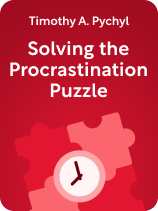

This article is an excerpt from the Shortform book guide to "Solving the Procrastination Puzzle" by Timothy A. Pychyl. Shortform has the world's best summaries and analyses of books you should be reading.
Like this article? Sign up for a free trial here.
Why is it so easy for people to procrastinate? What productive habits can we build to overcome procrastination?
Procrastination is frustrating because we know what it is and we can see how it hurts us, but we keep doing it anyway. In Solving the Procrastination Puzzle, Timothy A. Pychyl explores three forces behind procrastination: our desire for rewarding experiences, our trouble making realistic plans, and our lack of preparedness for obstacles and challenges.
Let’s look at the reasons why we procrastinate, and what we can do to stop them.
1. We Seek Out Rewards, and We Prefer Rewards Now Over Later
The first reason why we procrastinate is that we want to have experiences that our brains perceive as rewarding—experiences that feel good rather than bad. According to Pychyl, this tendency explains two psychological causes of procrastination: your preference for getting a reward now even if there will be costs later, and your preference for a reward now over a better reward later.
We Choose a Reward Now, Even if There Are Consequences Later
One way that your brain’s love of rewards causes procrastination ties into the insight, which Pychyl emphasizes throughout the book, that you often procrastinate so you can avoid confronting the uncomfortable emotions or thoughts that a task brings up. When you feel you’ve sidestepped negative feelings, at least temporarily, that can feel rewarding. Procrastination becomes a habit when you do this over and over again, establishing a pattern of avoiding tasks so you can feel rewarded now and deal with the costs of those decisions later.
What to Do About It:
To keep your brain’s shortsighted desire for rewards from getting the better of you, Pychyl first recommends planning ahead for the moment you’ll feel the temptation to procrastinate. You can do this by making what psychologists call “predecisions.” As the name suggests, predecisions are decisions you can make before you find yourself in a challenging situation to smooth the path toward a better decision in the moment.
For example, you can make a predecision that if you catch yourself trying to put off going for a run, you’ll respond by getting up right away and putting on your running shoes. Deciding in advance about the timeline on which you’ll act and the specific part of the task you’ll tackle first can help you replace one habit—skipping your run because you don’t really want to go—with another habit—lacing up your shoes as soon as you catch yourself thinking you don’t want to go. Once your running shoes are on, you might as well get out the door, right?
A second strategy Pychyl recommends for resisting the reward of avoiding your negative emotions is determining which feelings prompt you to procrastinate. By noticing what goes through your head in those moments, you can learn to recognize specific emotions that make you want to put off a task and plan to deal with them, perhaps by making a predecision about what to do when you notice that familiar feeling. Pychyl notes that it can also be helpful to realize that you aren’t your emotions, and you don’t have to let temporary feelings dictate how you behave.
For example, you might realize you’re putting off working in your garden because you’re feeling annoyed about the gray weather. By acknowledging your irritation as a trigger for procrastination, you can make the predecision to deal with that feeling of annoyance by putting on your chore coat and getting to work instead of letting a gloomy day (or a gloomy mood) decide how you act.
Pychyl notes that predecisions are helpful not only for planning how you’ll react to emotions but also for building healthier responses to the excuses you use to justify procrastination. This means that you can decide ahead of time to turn your excuses for procrastination into triggers for more productive habits. For example, you can decide that when you catch yourself saying you’ll watch Netflix now and do your chores later because you’ve had a rough day at work, then you’ll get up and wash the dishes.
We Care Less About Future Rewards Than Present Ones
A second way that the reward circuitry in your brain trips you up, says Pychyl, is by incentivizing you to pick a reward now over an even better reward later. While it would feel rewarding to finish a project or achieve a goal later, your brain wants you to instead choose a much smaller, more immediate reward, like a half-hour spent scrolling through TikTok videos you’ll immediately forget.
Choosing a small reward now instead of a big reward later doesn’t quite make sense, so your brain also knows exactly how to convince you that your decision is sound. Pychyl points out that when you procrastinate, you know the decision to put off an important task doesn’t align with your values or goals. This means you experience cognitive dissonance: the uncomfortable tension that arises from holding two conflicting ideas in your mind at the same time. (For example, those conflicting ideas might be “I want to exercise more” and “I’m not going to run today.”) One way you resolve the tension and explain away the dissonance is by making excuses about why now isn’t the right time for the task—but tomorrow will be different.
What to Do About It:
To stop prioritizing rewards in the present, Pychyl recommends a strategy that might help you use cognitive dissonance to get things done. When you catch yourself wanting to procrastinate, you can remind yourself how the task or project at hand will contribute to your goals and help you uphold your values. That way, you notice that while it would feel rewarding to kick back and relax now, you’ll feel even better if you accomplish your goal later. Connecting tasks to goals can help you see the dissonance between wanting to achieve your goal and choosing to do nothing. It can also help you remember that what you do today matters and make it easier to begin working rather than do nothing.
2. We’re Bad at Planning
The second reason we procrastinate is that we have trouble with planning. Figuring out how to accomplish everything on your to-do list requires planning when and how you’ll get things done. But most of us aren’t very good at these kinds of plans. Pychyl explains that this puts you on a direct path to procrastination by making you think you really will feel like doing a dreaded task tomorrow and tripping you up when you estimate how long a task will take.
We Genuinely Think We’ll Do It “Later” or “Tomorrow”
Pychyl writes that you probably tell yourself that you don’t feel like doing a task now, but you’ll feel like it “later” or “tomorrow.” Almost every time, you’re definitely wrong, yet you genuinely feel like you’re right. That’s because, in addition to having trouble planning, your brain also has trouble predicting how you’ll feel in the future.
Because of a cognitive bias called focalism, you don’t think about all of the factors that will affect your mood in the future. You might really think you’ll feel like cleaning the house tomorrow night. But you’re likely not considering how a long day of work will leave you tired and an evening helping your kids with homework will make you grumpy about having to relearn fractions. Plus, because of a bias called presentism, you assume that how you feel now is how you’ll feel later. But this often isn’t accurate. You likely feel a lot more enthusiastic about leaving the cleaning until tomorrow in the present (as you’re making that decision) than you will in the future, when “tomorrow” is here and it’s time to get to work.
What to Do About It:
Pychyl explains that one of the best things you can do to stop your trouble with planning from leading to procrastination is to rethink your assumptions about motivation. It feels hard to get started on a task when you aren’t feeling motivated, and you’re expecting to feel more motivated tomorrow. But it’s important to realize that not only are you unlikely to feel motivated later, but that you don’t even have to feel motivated to just begin working. Then you can establish a habit of starting work right away, regardless of whether you feel like it or not.
We Underestimate the Time a Task Will Take
Another problem that contributes to trouble with planning, and then to procrastination, is the inability to accurately predict how much time you’ll need to complete a task. Pychyl explains that because of a cognitive bias called the planning fallacy, you probably underestimate the amount of time each task will take. You might think it’s reasonable to leave a task until Sunday, since it’ll only take you two or three hours to get it done. But come Sunday, it might take you six or seven hours instead, far longer than you expected.
What to Do About It:
As Pychyl explains it, familiarizing yourself with the planning fallacy—and watching it in action as you try and fail to accurately project how long a task will take—can give you another reason to cultivate the habit of beginning a task right away. If you know that your estimated timelines are likely wrong, then you can see the benefit in beginning work on even a small part of the project right away rather than putting the whole thing off.
3. We Aren’t Prepared to Deal With Obstacles Along the Way
A third reason we find ourselves procrastinating is that we don’t prepare for even the most obvious things that might go wrong, according to Pychyl. You know yourself and know how you typically behave, but you likely don’t use that information to your advantage. That leads to two causes of procrastination: neglecting to prepare for distractions and failing to see how your personality may prime you to delay your tasks.
We Aren’t Prepared to Deal With Distractions
Pychyl explains that one of the most common obstacles that can throw you off when you work toward a goal is also one of the simplest: distractions. Whether they come in the form of colleagues knocking on your door or push notifications from your favorite social media app, distractions pull your attention away from what you need to do and make it harder for you to make meaningful progress. But as Pychyl notes, you probably don’t prepare yourself to run this gauntlet of interruptions.
What to Do About It:
Pychyl recommends that you start by reducing potential distractions (especially internet-related distractions) before you even sit down to begin work. You might put your smartphone away in a drawer, close all of the windows on your computer except the one you need, and draw your shades.
You might also find it useful to take note of the distractions you face as you’re trying to get work done so you can plan for them. Pychyl recommends observing the points in a task where you tend to give in to distraction. Plan to get past these predictable hurdles by removing the distractions that pull you away from your work or by making a predecision about how you’ll handle these difficult moments.
We Don’t Recognize Personality Traits That Make Us Likely to Procrastinate
Another obstacle that might stand between you and your goals—and divert you toward procrastination if you don’t prepare for it—is more difficult to change: your personality. Pychyl explains that certain personality traits have been linked to procrastination. Three traits, in particular, seem to have a marked link to higher rates of procrastination: Neuroticism (the tendency to experience negative emotions more than other people), impulsivity (the inclination to make choices without thinking them through fully), and perfectionism (specifically the kind of perfectionism caused by your perception that other people have unrealistically high expectations of your performance).
What to Do About It:
While you could try to change your personality, that’s not the strategy that Pychyl recommends. Instead, he advises that you pay attention to the traits you have and how they prompt you to respond in your usual way (that is, how they make you prone to procrastination). Then, you can decide how to change that response. For example, you can counter the perfectionism that arises from thinking your boss won’t accept anything except brilliant ideas by learning to remind yourself that all ideas are welcomed and valued at your team’s meetings.
Whether or not you have personality traits linked to procrastination, Pychyl emphasizes that you can’t rely solely on willpower to overcome it. He explains that willpower is limited, and it’s much more effective to make realistic plans to curb your procrastination than to assume you can change through sheer force of will. But when you know you’ll need to rely on willpower, Pychyl recommends preparing by getting enough sleep, spending time with people who give you energy, and not relying on willpower at the end of the day when you’re tired.

———End of Preview———
Like what you just read? Read the rest of the world's best book summary and analysis of Timothy A. Pychyl's "Solving the Procrastination Puzzle" at Shortform.
Here's what you'll find in our full Solving the Procrastination Puzzle summary:
- The real reason why you procrastinate
- How procrastination undermines your ability to live a happy, healthy life
- Practical advice for changing your relationship with your most dreaded tasks






